“What wins is just dogged resilience, day in, day out.”
Olympic gold medalist rower Katherine Grainger and Ben Medlock, co-founder and CTO of SwiftKey, on what lies beyond brains and brawn
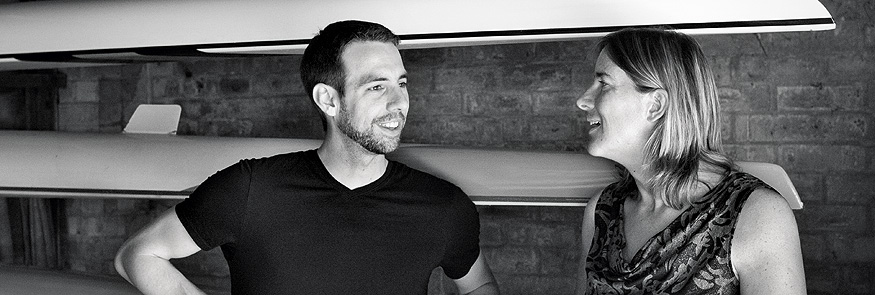
What do Olympians and game-changing entrepreneurs have in common? As extraordinary achievers they share certain personality traits, not least an exceptional desire to excel. “Britain’s golden girl of rowing” Katherine Grainger and “technopreneur” Ben Medlock discuss obsession, going for the gold, and the Lennon-McCartney thing at Marlow Rowing Club, an hour west of London, on a dreadfully hot summer’s day.
Ben Medlock: I have to ask: How can anyone maintain the raw level of commitment – day in and day out, for years on end – to win a gold medal?
Katherine Grainger: As you can imagine, the training isn’t particularly exciting or glamorous; it is very hard all the time! The one thing that holds you is that amazing ambition, which feels like an unachievable dream for most of the time. It’s what drives you, because it is so special, it is so different, it is so rare. So for me it’s the passion. I just love rowing. As you get into the sport, it becomes very obvious why you would want to be on the Olympic team, and why you want to be an Olympic champion. Sports are populated with role models and heroes who have led the way. Winning a gold medal is the most obvious goal, the ultimate proof that you are good at what you do. But if you look to the odds, it is so unlikely from the start that you are going to be Olympic champion. Only a tiny number of people in the world have ever done it. But I guess making it into the world of tech millionaires is pretty rare too and probably takes the same kind of extreme commitment.
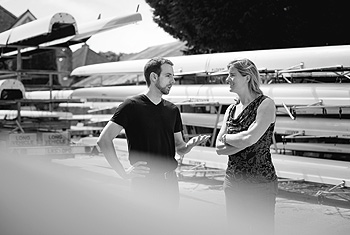
Medlock: I must admit I have a somewhat obsessional personality! I think I could plot my life as a series of obsessions, or perhaps challenges is a nicer way to put it! I have always defined myself by what I do, and that also drives me to achieve. I get so tied up in achieving whatever I’m currently focused on, the thought that I might stop is complete anathema because what I’m doing is so much a part of the way I define myself. So however hard it is, and even if I feel discouraged, I never really think about stopping, because to stop is not to be who I am.
Grainger: Stopping may be tough, but there are times when keeping on looks even tougher. I had to think long and hard about pushing on after narrowly missing the gold medal in Beijing in 2008, because it was really upsetting. To me it was a failure, absolutely and completely a failure. You give your life to a goal, you absolutely devote your life to it, and to have it end like that was very difficult. It led to a bigger question – if I wanted to go through it all again. I was asked at the time if I felt like I had wasted four years of my life. It’s an eye-opener to think that you’ve done what you’ve done for four years and not achieved what you set out to achieve. For me the result was always about getting the right medal. But in the end I’ve realized that the medal isn’t the whole story. What you do in those four years is equally or even more important, more valuable, more precious than the result. So if I could get those four years right, then it would be worth doing it.
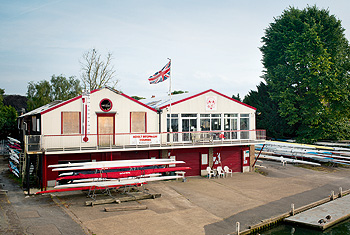
Medlock: Is it true that you got into rowing by accident?
Grainger: I went to university to study law and had no plan to go into rowing or any other sport at that high level. It was the fellow rowers that hooked me before the sport itself did. They’re very driven, very passionate, and a lot of fun and quirky as well. I always had the feeling I wanted to be as good as I could be at anything I did, but I never thought that it would be actually at this level. At first, I wanted to be the best novice that I could be, and then I wanted to be the best senior that I could be on the team. In my third year at university, someone said I could row for Scotland, so I said to myself: Okay, that’s my goal then. In my fourth year at Edinburgh someone suggested I should go in for the Team GB trials. I honestly didn’t think I would make the team. It was the year after the Olympics, so it was the Olympic team I was trialling against and I just thought “no chance!” But what you realize when you enter the trials, is that they are looking not for a fully formed athlete, because that is what they teach you. They are looking for people who have something at a psychological level as well as the physical level. And when they see that potential, they say “she’s the one.” It was like that.
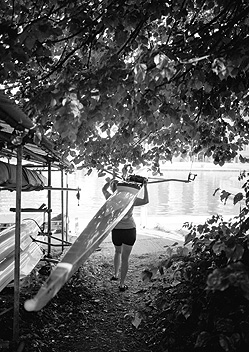
Medlock: So you weren’t thinking at the start “I could win a gold medal.”
Grainger: Few Olympians start a sport with the thought that they’ll be Olympic champions. Most of them start the sport for other reasons, and then, gradually, develop increased ambitions over time. A lot of people assume it’s there to start with, that you need to have that drive from the start, and were born thinking “this is my destiny.” But that’s not the case. What about you? Were you born to be an entrepreneur?
Medlock: Well, yes and no. We started out in 2008 with this idea that people were going to do a lot of typing on smartphones and it needed to be made easier. We felt like we’d got a really interesting idea – but that we had a one-in-a-thousand shot of actually getting into the market ahead of the major players. However, we focused on how to demonstrate that our idea was better than the existing technology, and kept at it.
It took us three years before we generated a story that was sufficiently interesting, and at every step we still felt the odds were stacked against us. But we took one more step, then one more step, and one more step – and at some point we had to stand back and say “how do we tell when we’ve made it? What exactly does success look like?”
Grainger: There’s no gold medal waiting at the finish line.
Medlock: Right, it’s more elusive than that. It’s about asking questions like: Was it when we became profitable? When we employed more than 50 people? Was it winning a particular award? All of these things are milestones. But I guess you never know when you can actually step back and say “Okay, now this is success.”
“Staying motivated is the name of the game.” – Katherine Grainger
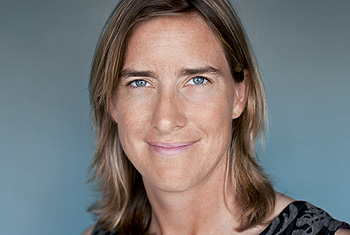
Grainger: One of the biggest success factors for me is the team I work with, my coach Paul Thompson, and the person I partner with in the boat – they make a huge difference when it comes to staying motivated. And as you can imagine, staying motivated is the name of the game. How did you choose your partner?
Medlock: Jon Reynolds and I were friends at university, which is an important part of our relationship. It helped us form a core of belief and perseverance, and a sense of trust that’s been incredibly important for us. What was clear from the very start was a sense of mutual respect, and the understanding that we had to be one hundred percent committed to this. I’m sure it’s the same with rowing – you have to absolutely believe that when it comes to achieving anything that’s hard to achieve, your partner too is going to put this above everything else.
It’s always been such a blessing that there are two of us, because when one of us is down, the chances are the other person is going to be more positive and so we pull each other through. There is no doubt that for me this central relationship has been of fundamental importance, particularly in the early days, when we had such a sense of inadequacy.
Grainger: The early days are a heady mix of raw drive and learning-on-the-fly…
Medlock: We had so much to learn. We consciously decided to absorb everything we could from anybody willing to listen and offer us advice. Neither of us found a sole mentor as such, but there were many people who contributed to our development. My PhD supervisor from Cambridge, one of the early investors in the company, may be the closest thing I’ve had to a personal mentor, but he is one of a crowd of people who were important to our story. Gradually we built up a network, and when you’re growing a young company, so much of it is about the network that you build.
Grainger: In rowing, you don’t get to choose who you are in the boat with, so it is always trickier. There are always combinations that should work on paper, but, as you said, a critical element is trust and attitude, and communication and belief in how you see things and how you want things to work. It is difficult to gauge. You can get the best athletes in a boat together, and it doesn’t quite work. It can almost work, you can perform on an incredibly high level, but there is something missing, and it’s often that something that makes the difference. It’s a chemistry thing. You can work to make it happen, but if it comes naturally, you are just leagues ahead before you even begin.
So when Anna Watkins and I were put together in the boat three years ago, we had been part of the team for five years, but had never actually rowed together. We had been in different boats the whole time, and then they put us together. We already had a lot of respect for each other. And it just felt right from the very first moment.
Medlock: Can you put your finger on exactly what felt so right?
Grainger: Well, you have to realize that the boat almost tells you what it needs and you have to be in tune with how it speaks to you. So I guess we were all on the same wavelength because we just flew away! Anna sits behind me, giving the instructions, and she said a couple of things that I was thinking anyway. And when I responded she said “that’s what I was going to say!” So it was like: Wow! It was so good and so easy, and we couldn’t help but imagine how good it could be if we could spend three years working at it. But the chemistry doesn’t count unless you’re also fast. You’ll only be allowed to team up if you’re good against the clock. So a couple of days later we did some race work, and we were fast in every single race. At that point we knew we’d be partners.
“Peace, contentment, and happiness rarely foster great creativity.” – Ben Medlock
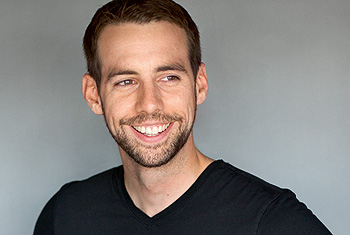
Medlock: I think part of the reason why my partner Jon and I have been successful is because the two of us often see things from quite different perspectives. This can lead to some pretty heated debates, but I think it’s ultimately healthy for the business because it keeps us on our toes and actually sharpens both of our thinking. It’s the classic Lennon-McCartney thing. Once the Beatles split up, that creative tension wasn’t quite there any more. The reality is that peace, contentment, and happiness rarely foster great creativity!
Grainger: I wouldn’t equate rowing with the need for creative tension, but it probably helps that Anna and I are different in some ways and similar in others. Personalitywise, we are different in that she is a mathematician by trade, very logical, very reasoned, very detailed, and great at analysing anything. But I have an arts background and work a lot more with instinct and hunches about things. The great thing was that, even approaching it from very different sides, we would generally come to the same decision, and our different approaches only strengthened that decision. We are similar in terms of what is important to us. We are both very clear in what we want from the boat, and how we want to get it. We are both very ambitious, and we always knew what the end goal was, and we absolutely believed that we’d do it.
Medlock: I’ve found that personality is every bit as important as your skill level. You can’t have just one of them if you’re going to succeed. You need both.
Grainger: Yes, our recruiters check for things like height and wingspan, and test your power at a rowing machine. But the one thing they can’t readily test is personality, the mental side. You can be the most talented rower in the world, but that doesn’t mean you’ll win, because what wins is just dogged resilience, day in, day out. People want things, but not everyone wants to put in the hard work it takes to get there. To be successful you have to work, adjust, fail, learn, and work some more… that’s all part of the process. You won’t get there without the right motivation.
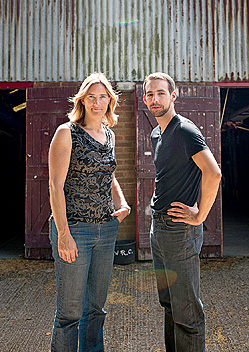
Medlock: In my business, curiosity is a critical source of motivation. To find something fascinating and not be able to let it go – that’s where curiosity meets obsession, which creates self-motivation. I have a hypothesis: find people who are deeply curious and you’ll find people who probably have strong potential. As with rowing, you can measure raw ability when recruiting. In my sphere, that means having people solve programming problems, logic puzzles, and that type of thing. That’s the easy part. At SwiftKey we use an online coding test, so before we ever meet a candidate, we’ll put him or her through this test and it gives us a broad, ballpark sense of how good a person is at problem-solving.
Grainger: But you’re clearly looking for more. You’re looking for that special something that tells you a candidate is going to bring you more than just brainpower…
Medlock: That’s where you rely on somebody recognizing not just talent but personality: How well does this person fit in with the ethos of our company? How well will they work as part of a team? That’s a difficult recognition task, and you need the power of the human brain to be able to tease out the different factors. One of the first things I did when we were growing the business was to hire somebody much more experienced than me at recruitment, someone who I believed could build the team of engineers we needed. That was an important step in the growth of our business.
Grainger: Have you thought about what’s next, after you’ve accomplished what you’ve set out to do with your company? For me, it’s not difficult to imagine I’ll need to find something else, because I can’t be an athlete forever, hard as I might try. What’s difficult is picturing what it could be, because I would want the same drive, same passion, and same challenge that rowing brings me. I’d want that in my life. At the moment I couldn’t tell you what that is, and that’s a little bit odd. I’ve had such a clear purpose for so long that it is very strange not having it.
Medlock: The thing that worries me to some degree is that every stage of life has been a bigger challenge, and I’m always driven to take on the next challenge, which is a bit bigger. So the eternal question is, what happens when this challenge is over? Maybe there isn’t anything else that demands the same level of immersion.
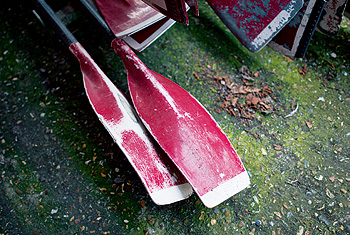
Grainger: Do you have anything going on in the background that could be the next big thing for you?
Medlock: There are a few things, but strangely enough the things that I have been obsessed about have always been very different. As a kid I was obsessed about becoming a spaceman, then a footballer, and then things gradually got more realistic. I wanted to become a musician, a singer-songwriter, then an academic, and then finally I obsessed about starting a business. I guess, in many ways, I’d like to do another business. But then I think “would it ever be the same again?” It must be even clearer for you, because once you’ve won the gold medal – the sort of thing most of us can only dream of achieving – how do you maintain your sense of self after such a thing? How does one ever top such a thing? I can almost imagine a period of grieving after such tremendous success.
Grainger: A lot of people actually do grieve. I’ve certainly grieved in the past, believe me. But winning the gold was such a big and emotional accomplishment that I didn’t grieve. I literally stayed on a high for at least five months. There was just absolute, unbelievable positivity from everyone, everywhere I went. That was the only thing I’ve done where, universally, everyone loved it and everyone was inspired and moved. I was so lucky to be a part of something so special, and whatever I do next, I wouldn’t try to beat that moment.
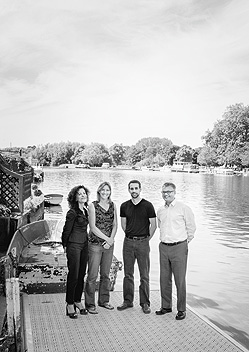
The dialogue between Katherine Grainger and Ben Medlock was facilitated by James Martin, Egon Zehnder, London and Ulrike Krause, THE FOCUS.
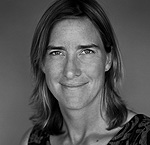
Katherine Grainger
Katherine Grainger, 37, is one of the most celebrated athletes in the UK and shares the record as the UK’s most decorated female Olympian. She is a three-time Olympic silver medalist in rowing, a six-time world champion, and best known for her dramatic gold-medal win at the 2012 London Olympics. She was appointed a Member of the British Empire (MBE) in 2006, and a Commander of the Order of the British Empire (CBE) in 2013. Grainger holds a law degree from Edinburgh University, an MPhil in Medical Law from Glasgow University, and has just completed her Ph.D. in Homicide at King’s College London. Her autobiography, Katherine Grainger: Dreams Do Come True (Andre Deutsch), was published in August 2013.
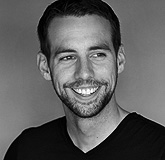
Ben Medlock
Ben Medlock, 34, is a celebrated “technopreneur” and the technical brains behind SwiftKey, a London-based company that has developed a highly innovative and practical intelligent-typing system for smartphones that has helped transform the mobile phone industry. The SwiftKey app was downloaded 50,000 times on the day it was launched in 2010 and has since reached over 15 million downloads. In 2012, SwiftKey beat Google for Most Innovative Mobile App from the Global Mobile Awards. Medlock has a PhD in Natural Language and Information Processing from the University of Cambridge, as well as an MPhil in Computer Speech, Text, and Internet Technology. He has also studied business and music which, like football, remains a passion for him.
PHOTOS: FRITZ BECK





